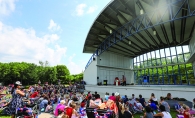To think of a playground as simply a place where kids play is to shortchange its importance. Spending time with other kids is an important part of a child’s development, and the playground is one of the best places for children to learn valuable social skills.
The idea of child development played an integral role in the designs of the new Plymouth playgrounds at Parkers Lake, French Lake and Providence Academy. Designed by Landscape Structures, the new spaces are specifically engineered to enhance a child’s play experience by creating a sensory-rich environment.
One of the biggest components to these playgrounds is color. Landscape Structures’ director of design Scott Roschi focused on using natural colors. Doing so creates a more calming atmosphere, and the nature-inspired hues make the space feel more like a true outdoor experience, he says.
Part of Roschi’s team included an advisory board that researches children’s play habits and the benefits of playing. Along with the color designers at Landscape Strucutres, they created mood boards and brought the different colors to test groups of kids to narrow down the best design for the playgrounds.
“Children are exposed to so many stimuli—from the toys at home to electronic devices,” Roschi says. “We really wanted to bring a different aesthetic that allows them to connect on a different level.”
In addition to the colors, the playgrounds incorporate different sensory experiences. The elements on the playground include equipment and games that spin, slide, swing and force children to climb.
“One of my favorite things is a piece of equipment called the ZipKrooz,” Roschi says. “It’s a long zipline experience, and we see both parents and kids using it. We encourage parents to be interactive, and that piece is a lot of fun for both children and adults.”
By having different elements on the playground, kids challenge and enhance important social, neurological and physical skills. Maggie Lesher is an occupational therapist with more than 30 years of experience working with kids. She founded Children’s Theraplay, which has a location in Plymouth, in 1993
“Play is the foundation of growth in the development of language, socializing and motor skills,” Lesher says. While Lesher didn’t work specifically on the Plymouth playgrounds, she is thrilled to see area parks incorporating important aspects for children’s development. Playgrounds help kids learn impulse control, forces them to learn how to take turns and helps them understand when they are invading others’ space, she says. These are particularly important traits for kids who have development issues.
Lesher works with a variety of disorders, including Down syndrome, cerebral palsy, ADHD and autism, and kids with more general issues like poorly developed motor skills. Her patients benefit from time on the playground, but so do other children.
“Playing is good for all children,” Lesher says. “It used to be a common part of children’s play, but throughout the past few decades, there has been a 50 percent decrease in unstructured play.”
Lesher says she has seen an increase in children whose social skills are developing more slowly, something she attributes in part to the decrease in unstructured play. Her hope is that with more playgrounds like the ones in Plymouth, all kids will get to experience the benefits of playing.









